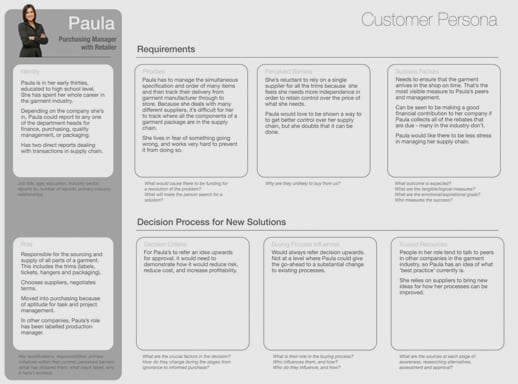In conversation with a group of CEOs at a recent event, most admitted that they are not at all sure what B2B marketing should be doing - or how they should measure B2B marketing ROI. My answer is: "Your marketing should be helping your business to grow".
To make sure that your marketing is well placed to do just that, here are five questions CEOs should be asking themselves or their Head of Marketing:
One: Are our marketing objectives aligned with those of our business?
First, what are your new business revenue objectives and how many average value sales do you require to meet those objectives? Once you know this you'll be able to start working out how many 'leads' you'll need to meet your sales objectives (because you probably know how many leads you need to generate a sale).
Secondly - what constitutes a lead? A lead that will be accepted and acted upon by your sales teams will need to have certain characteristics. What are they and how does your marketing ensure the leads they generate have those qualifications/characteristics? The truth is: many businesses do not identify these characteristics, creating one of the biggest barriers to achieving a marketing R.O.I.
Two: Does our marketing department create leads our salespeople actually want?
Research by Sirius Decisions shows that up to 80% of marketing-generated leads do not get followed up by sales. That is an alarming fact when you consider how many people claim that lead generation is one of their biggest marketing objectives. Mostly leads are not followed up because sales have no faith these leads will be qualified. In all too many organisations, a lead is in fact just contact data - but a true lead is more complicated than that.
Some 45% of business to business (B2B) sales enquiries go on to buy within 24 months. However, these leads need to be nurtured and kept warm because they are not ready to buy at first contact. Very often, sales teams are incentivised on a monthly or quarterly basis, so it is not so surprising that they choose to focus their efforts elsewhere. This is, of course, particularly the case in complex B2B sales environments. That's why marketing should be responsible for nurturing these leads until they are sales-ready. We do this by keeping in contact through emails with follow-up offers that match our content to the information needs of the buyer at every stage of the online buying process.
Three: Does marketing understand our customers?
This has always been important but is still overlooked, with the level of understanding usually superficial. If you don't know who has bought your products in the past, how will you know how to target your marketing and sales efforts in the future? More importantly, many companies focus on traditional segmentation such as company size, vertical market, job titles of buyers and so on. This will only take you so far because it doesn't give you insight into the motivations behind a purchase.
All good sales people know that it's not features but benefits that drive the desire to buy. Stated benefits will only resonate with the buyer if they are benefits that the buyer cares about, and to know if that's true you need to have a level of understanding that goes beyond the turnover of the prospect's company. Of course, in most cases this knowledge is held within the organisation, but it doesn't always get through to marketing and it must if communication is to be effective.
At Axon Garside, we formalise this knowledge through the creation of marketing 'personas'. These personas are representative profiles that focus on customer challenges, perspectives and personal and business goals like the one below (developed by Matthew Goldsbrough):

At the recent Hubspot marketing conference in Boston, one of the most interesting sessions I attended featured a senior executive from HP Software who explained that the creation of marketing personas had given new focus to all marketing programmes - whatever the objective. Now every campaign, he reported, was focused on a specific persona or personas, with much better results.
Four: Is our marketing still interrupting potential buyers?
Is it still the objective of your marketing to stop potential buyers from doing what they want to do and forcing them to listen to what you want to say? Or has your company become a magnet for buyers when they choose to look for you? Which option sounds more likely to achieve its objectives?
As web usage has grown, people have become increasingly resistant to the kind of traditional marketing that seeks to stop someone doing what they want - whether that be reading a magazine, getting on with their work or enjoying their day off. Don't think it is just those annoying calls from people in call centres.
It doesn't matter whether we have our home or business hats on - we have become very good at avoiding interruptive marketing (often called 'outbound marketing' - sending messages out to the potential customers in the hope you'll get their attention).
As business buyers, people will now find you when they want to solve a problem or make a purchase rather than wait to be found:
As a result of this, the most forward-looking B2B and B2C marketers are switching their budgets away from outbound marketing in favour of inbound marketing. Inbound marketing is the process of turning your marketing - and particularly your company website - into a magnet for potential buyers when they take to the web to find products and services that can help them to solve their problems.
Online marketing has the great advantage not only of running with the flow of the buyer's processes and behaviour rather than trying to push against them but also of turning websites into a lead generation tool rather than just an online brochure. To do that you'll need content that is matched to what the buyer is searching for and which can be read by search engines. Our step by step guide to B2B inbound marketing explains this in more detail.
Five: Can we measure the effectiveness of our marketing?
It was Henry Ford who said “I know only half of my advertising works. The problem is, I don’t know which half.” That was nearly one hundred years ago, for goodness' sakes! It shouldn't be that way anymore. There are really three key measurable marketing objectives that matter:
- How many people got to see a campaign or marketing piece?
- How many of those gave you their contact details and therefore became a lead?
- How many leads turned into sales-ready opportunities that were taken up by sales?
And, of course, how many opportunities turned ultimately into revenue?
As 78% of B2B purchases start with a web search, website metrics are very important. In this context the measures are:
- How many people visited your website?
- How many of those gave you their contact details through a web form?
- How many of those 'leads' became sales-ready?
Note that page rankings, time on site, number of pages looked at and all those other measures favoured by search engine optimisation (SEO) companies are not on my list. These things have value but they are details which in themselves will not create business. If a website visitor doesn't identify themselves by giving up their contact details it is virtually impossible either to identify them so that they become leads or to measure any return on investment. Further; unless those leads are accepted by sales they'll never turn into sales. And without sales you won't have any return on your investment.
A digital marketing tool like Hubspot, which we use at Axon Garside, gives users the ability to focus on the important metrics through an easy-to-use dashboard.
One of the biggest reasons that CEOs often despair of measuring the effectiveness of their websites and the returns from other marketing programmes is that they become bogged down in irrelevant figures.
If your answer to the five questions above is 'yes' then your marketing is on a sound basis and you're probably achieving clearly stated marketing objectives. If you have one or more 'No' answers then you may not be getting the return that you'd like.







.png?width=115&height=183&name=sade%201%20(1).png)